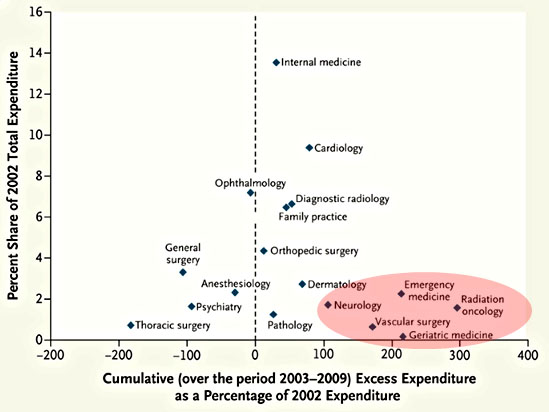Sarah Kliff points us to an article in the New England Journal of Medicine that tries to isolate the reason that Medicare payments for physician services have gone up faster than Congress predicted in the late 90s. The chart below tells the basic story. General surgery, anesthesiology, and internal medicine have basically done OK. Emergency medicine, geriatric medicine, and radiation oncology have skyrocketed.

Using this data, the authors draw the following conclusion about the Sustainable Growth Rate formula adopted by Congress (and temporarily rescinded every year when they pass the annual “doc fix”):
We do not mean to suggest that the SGR physician-payment system should be restructured according to either state or specialty. For example, the arrival of new technologies in one area of medicine may justify faster growth in some specialties relative to others. Rather, our analysis illustrates that across-the-board cuts in fees are too blunt an instrument to restrain the growth of spending on physician services. In fact, any form of target expenditures for physicians who are not part of a coherent risk-bearing organization that is responsible for patient care will produce pathologies similar to those revealed in the graphs.
Unfortunately, that sentence in bold is key. It’s not clear to me that the data here justifies any conclusion at all, because it measures total spending, not the amount spent specifically on physician fees, which is the subject of SGR. If hospitals are eagerly building $100 million proton therapy centers for cancer treatment — and they are — then Medicare spending on radiation oncology is going to skyrocket. But does that mean that oncologist fees should go up? Not really.
Now, the SGR formula might well be broken regardless. Doctors set their fees to cover their overhead, and if overhead is going up faster in some areas than in others then that means fees will go up faster in some areas than in others. But I’m not sure how looking at total spending allows us to draw conclusions about that one way or the other.

















